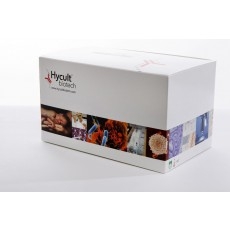C1q, Human, ELISA Kit
- Supplier: Hycult Biotech
Product Description
- C1q forms together with C1r and C1s the C1 macromolecule, the first component of the classical complement pathway. The formation of an antibody–antigen complex (immune complex) is the principal way of activating the classical pathway of the complement system. C1q triggers the activation process when it docks onto antibodies within these immune complexes. In this way, C1q acts to bridge the innate and adaptive immune systems. Interaction of immune complexes with C1q induces a conformational change within the C1 complex, which results in activation of the classical pathway. C1q functions as recognition unit by binding to the heavy chain of IgG or IgM (Fc gamma and Fc micro) provided that the immunoglobulins are bound to their antigen. Furthermore, C1q can bind to apoptotic blebs, where it activates the classical complement pathway and mediates phagocytosis. As such, C1q promotes the clearance of apoptotic cells and subsequent exposure of auto-antigens, thereby preventing stimulation of the immune system. C1q is predominantly produced by macrophages but also by follicular dendritic cells, interdigitating cells and cells of the monocyte-macrophage lineage. C1q deficiency has a profound effect on host defense and clearance of immune complexes. Inherited C1q deficiency is also associated with the development of systemic lupus erythematosus (SLE). In the case of C1q deficiency, SLE is found in 90% of reported cases. C1q plays a role in the prevention of autoimmunity by facilitating the physiological clearance and processing of apoptotic debris. Absence of C1q may cause autoimmunity by impairment of the clearance of apoptotic cells. _x000D_
- Anti-C1q autoantibodies deposit in glomeruli together with C1q but induce overt renal disease only in the context of glomerular immune complex disease. This provides an explanation why anti-C1q antibodies are especially pathogenic in patients with SLE._x000D_
- Low C1q levels are associated with proliferative glomerulonephritis (WHO class III and IV). Furthermore, C1q concentrations decrease prior to clinical manifestations of flares of the disease. Low C1q levels have also been shown to predict the histopathological outcome of lupus nephritis. A single nucleotide polymorphism in the C1QA gene results in decreased C1q serum levels and has been linked to photosensitive Lupus-specific skin disease, subacute cutaneous lupus erythematosus (SCLE).
- The human C1q ELISA kit is to be used for the in vitro quantitative determination of human C1q and Ig containing circulating immune complexes (CIC) in serum, plasma and bronchoalveolar lavage fluid (BALF) samples.
Resources
Product Options
| Product Number | Description | Package Size | List Price (CAD) | ||
|---|---|---|---|---|---|
| HYBHK35601 | C1q, Human, Elisa Kit | 1 x 96 det. |
CA$1,373.00
|
Add to Cart | |
| HYBHK35602 | C1q, Human, Elisa Kit | 2 x 96 det. |
CA$2,120.00
|
Add to Cart |
List Prices are displayed.
Please register or log-in to the site to view your organization’s prices, or please add the products to your cart and click the “Request a Quote” button to receive price and availability information (include quantities for each product and indicate either a one-time purchase or your annual usage.)



